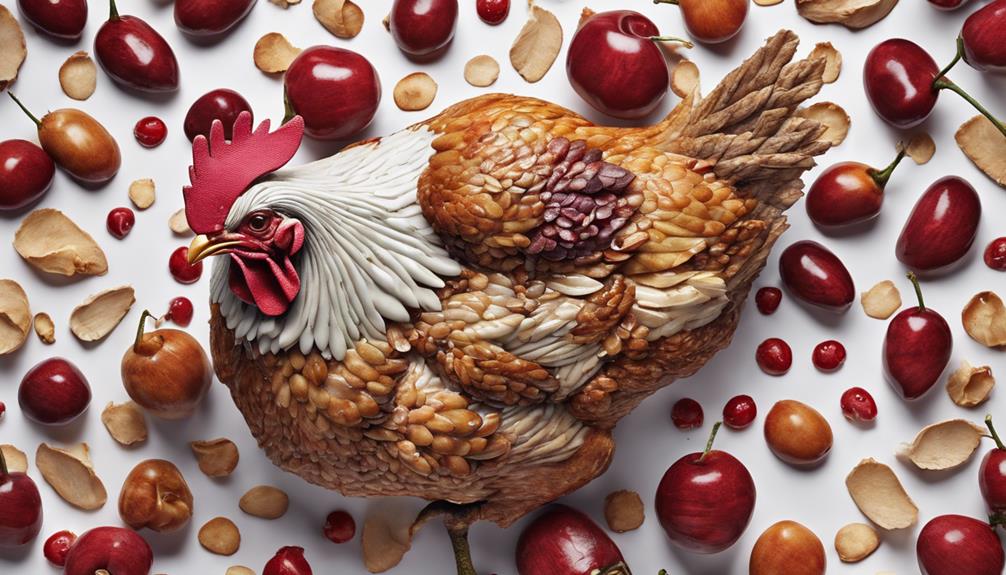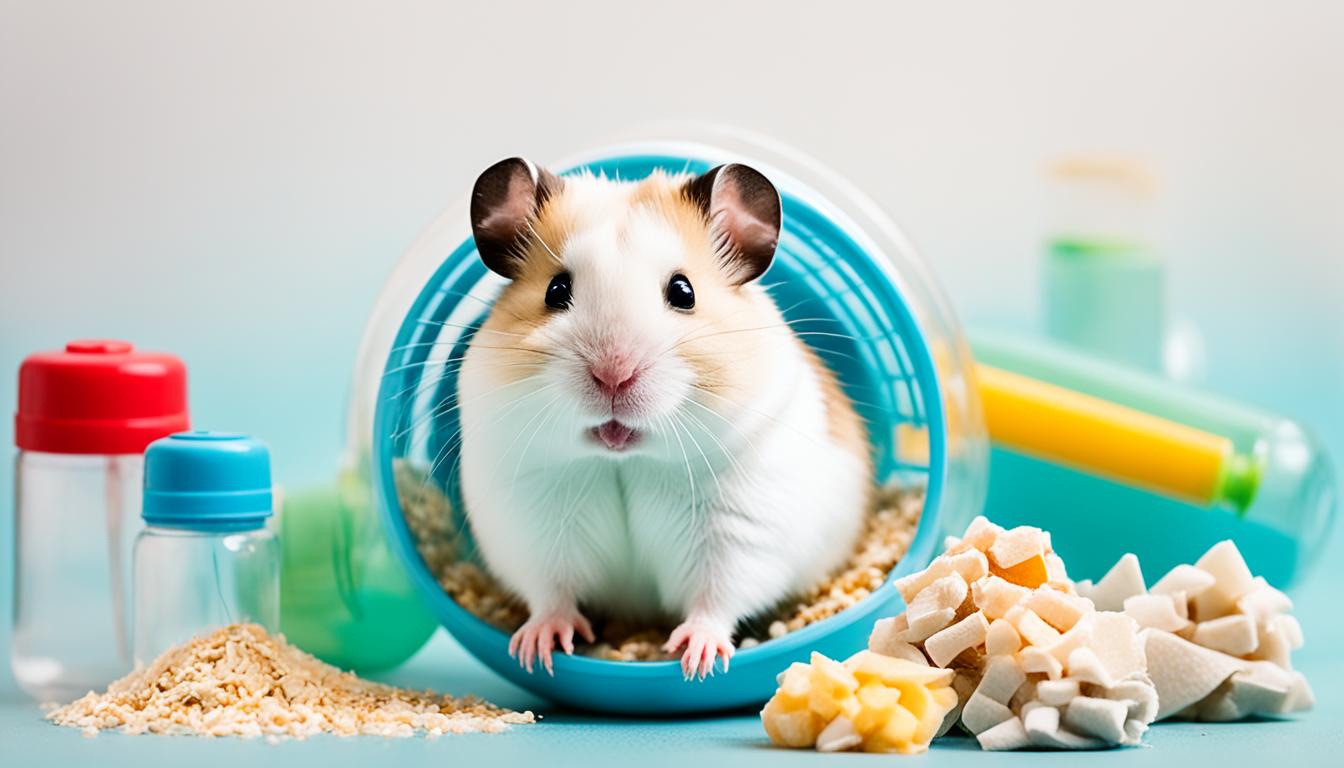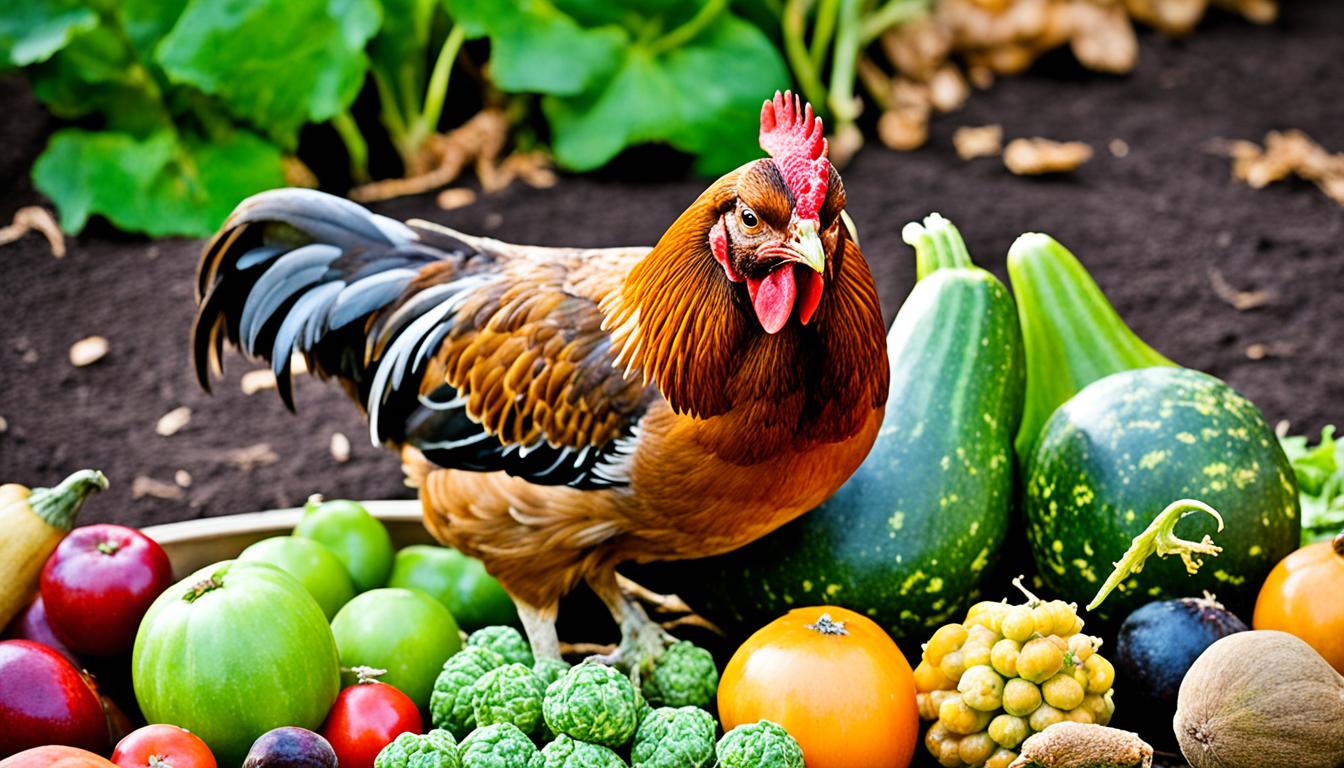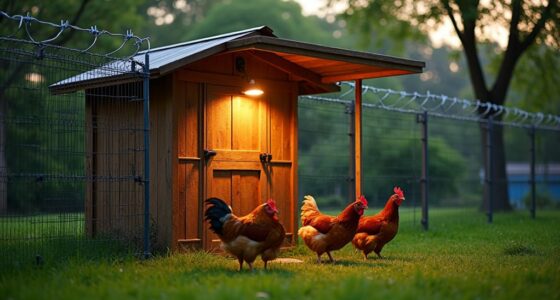Chickens should avoid consuming cherry pits as they contain cyanide, which can result in poisoning and harm. Knowing the risks associated with these pits is crucial for maintaining the health and well-being of your poultry.
It's important to ensure that cherry pits are disposed of safely and kept away from areas where chickens have access. By being vigilant and proactive, you can prevent any accidental ingestion of harmful substances by your chickens.
Key Takeaways
- Cherry pits contain cyanide, risking poisoning in chickens.
- Safe alternatives include pitted cherries or cherry flesh.
- Cherries offer essential nutrients and antioxidants for chickens.
- To safely feed chickens cherries, remove pits and cut into small pieces.
- Precautions: Avoid feeding cherry pits to prevent health risks.
Potential Risks of Cherry Pits for Chickens
Cherry pits pose a significant risk to chickens due to their cyanide content, which can cause poisoning and severe health issues if ingested. Cyanide compounds found in cherry pits can lead to cyanide poisoning in chickens if consumed. Symptoms of cyanide poisoning may include difficulty breathing and convulsions, posing a serious threat to the health of the birds.
It's crucial to avoid feeding chickens cherry pits to prevent potential health risks associated with cyanide exposure. When chickens eat cherries, it's essential to ensure that they don't have access to the pits, especially around cherry trees where pits may be abundant. By being vigilant and proactive in removing cherry pits from the chickens' environment, owners can safeguard their flock from the harmful effects of cyanide poisoning.
Safe Alternatives to Cherry Pits

When considering safe options for feeding chickens cherries, it is essential to provide the fruit without pits to prevent potential health risks. Chickens can eat cherries without the worries associated with the pits, ensuring their safety. Offering pitted cherries is one of the best ways to let chickens enjoy this fruit without exposing them to the dangers of cyanide poisoning. By removing the pits before feeding cherries to chickens, you eliminate the risk of any toxic components. Not only does providing cherries without pits keep your chickens safe, but it also allows them to benefit from the fruit's nutritional value, which includes being rich in antioxidants.
| Safe Alternatives to Cherry Pits | Benefits |
|---|---|
| Whole cherries without pits | Safe for consumption |
| Cherry flesh only | Nutrient-rich |
| Pitted cherries | No toxic risks |
Nutritional Benefits of Cherries for Chickens
After discussing safe alternatives to cherry pits for chickens, exploring the nutritional benefits of incorporating cherries into their diet reveals significant advantages for their overall health and well-being.
Cherries are a rich source of essential nutrients such as Vitamin C and A, crucial for boosting the immune system of chickens and helping them ward off illnesses. Additionally, cherries contain minerals like potassium and magnesium that support overall health and vitality in chickens, contributing to their well-being.
The antioxidants present in cherries play a vital role in protecting chickens against various diseases and health issues, further enhancing their overall health. Moreover, the fiber content in cherries promotes digestive health in chickens by aiding in proper digestion processes.
Including cherries in moderation in a chicken's diet can lead to improved digestive health, stronger immune systems, and better overall well-being. Therefore, incorporating cherries into a balanced diet can offer various benefits for chickens' health and vitality.
How to Safely Feed Chickens Cherries

To safely feed cherries to chickens, it's essential to remove the pits to prevent potential cyanide poisoning. Cherry pits contain cyanide compounds which can be harmful to chickens if ingested.
After removing the pits, cutting cherries into neat, small pieces makes them easier for chickens to consume without posing a choking hazard. Cherries are a good source of Vitamin C and other essential nutrients beneficial for chicken health when fed in moderation.
While cherries are generally safe for chickens to eat, overconsumption can lead to digestive issues and health problems. It's crucial to wash cherries thoroughly to remove any pesticides or contaminants before offering them to chickens.
Additionally, when feeding cherries to chickens, ensure they're part of a balanced diet to prevent any nutritional imbalances. By following these guidelines, you can safely incorporate cherries into your chickens' diet without risking their well-being.
Precautions When Offering Cherries to Chickens

Taking precautions when offering cherries to chickens is crucial to safeguard their health and well-being. Cherries contain pits that pose a significant risk to chickens due to the cyanide compounds they harbor. Cyanide poisoning in chickens can result from ingesting cherry pits, leading to symptoms such as difficulty breathing and convulsions.
To mitigate the potential health risks associated with feeding cherries to chickens, it's strongly advised to refrain from providing them with access to cherry pits. Preventing chickens from consuming cherry pits is essential in ensuring their safety and avoiding any harm that could arise from cyanide poisoning.
Frequently Asked Questions
Are Cherry Leaves Toxic to Chickens?
Yes, cherry leaves are toxic to chickens. Consuming wilted cherry leaves can lead to cyanide poisoning and severe health issues in chickens.
It's crucial to prevent access to cherry leaves as they contain toxic compounds harmful to their health. Ensuring chickens don't ingest cherry leaves is essential to safeguarding their well-being and preventing poisoning.
Proper care must be taken to avoid any potential exposure to these toxic plant parts.
What Food Scraps Should Not Be Fed to Chickens?
We must be cautious with food scraps for chickens. Avoid giving them toxic options like chocolate, avocados, green tomatoes, and canned cherries. Ground cherries with solanine are also harmful.
Instead, opt for safe treats such as apples, blueberries, and plums. Remember, what we feed our chickens directly affects their health and well-being.
It's crucial to prioritize their safety and provide them with nutritious options.
Is There Anything Chickens Can't Eat?
Absolutely, chickens have dietary restrictions to ensure their well-being. Some foods, like cherry pits, pose serious health risks due to cyanide content. Monitoring and limiting access to hazardous items is crucial for chicken safety.
Preventing ingestion of potentially harmful substances, such as cherry pits, must be a priority for responsible chicken care. It's essential to be aware of what chickens can't eat to protect their health and promote their longevity.
What Seeds Can Chickens Not Eat?
Certainly!
Chickens shouldn't consume certain seeds like apple seeds, which contain cyanide, and cherry pits due to their cyanide content. These compounds are harmful to chickens and can lead to poisoning. It's crucial to prevent access to such seeds to avoid health risks.
Additionally, feeding chickens seeds that can pass through undigested isn't recommended. Monitoring their diet to exclude harmful seeds is essential for their well-being.
Is it Safe for Chickens to Eat Food Scraps and Leftovers?
Yes, safely feeding chickens potato peels is a great way to reduce food waste. Chickens can eat a variety of food scraps and leftovers, including potato peels, as long as they are given in moderation. However, be cautious about giving them moldy or spoiled food, as it can make chickens sick.
Conclusion
In conclusion, while cherry pits may pose a risk to chickens due to potential cyanide content, there are safe alternatives to feed them. Cherries can provide nutritional benefits to chickens when offered in moderation.
Like a farmer tending to their crops, it's important to take precautions when feeding cherries to chickens to ensure their safety and well-being. By following these guidelines, you can enjoy sharing this treat with your feathered friends without worry.










